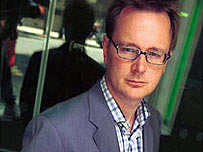 The BBC has signed a Memorandum of Understanding with Microsoft. Areas of the potential investigation and collaboration that the non-exclusive agreement includes, covers “search and navigation, distribution, and content enablement” (what ever that means in English).
The BBC has signed a Memorandum of Understanding with Microsoft. Areas of the potential investigation and collaboration that the non-exclusive agreement includes, covers “search and navigation, distribution, and content enablement” (what ever that means in English).
It was signed in a meeting that sounds like it was designed to massage the egos of Mark Thompson (BBC Chief) and Ashley Highfield (BBC Head of Tech), held with Bill Gates (queue trumpets) at Microsoft’s office in Seattle.
Highfield is quoted as saying “Microsoft is not just a key supplier to the BBC, it is also a key gateway to audiences that the BBC needs to reach through Web services it runs like MSN and Windows Live Messenger, and hardware such as Xbox® and the Windows Media Center.” Apparently trying to balance this, he continued “The BBC needs to work with all players in this space to make sure our programmes and content are enjoyed by the widest possible audience, without always having to come to bbc.co.uk to find it.”
It’s with horror that we read this news. It’s hard to imagine that the BBC will stay format neutral following a deal like this.
 Microsoft has been creeping into the BBC’s online media for a long time now. It first came to light when we broke the story near the start of 2004 that the BBC’s interactive media player trial (as it was then) would be using the Microsoft’s media format and DRM. At that point, the story BBC spun, was that they weren’t committed to using Microsoft’s DRM, but each stage of the trial beyond that, did.
Microsoft has been creeping into the BBC’s online media for a long time now. It first came to light when we broke the story near the start of 2004 that the BBC’s interactive media player trial (as it was then) would be using the Microsoft’s media format and DRM. At that point, the story BBC spun, was that they weren’t committed to using Microsoft’s DRM, but each stage of the trial beyond that, did.
The news today doesn’t go a long way to changing our view that it won’t be a permanent feature.
Of course Gates and Highfield shared a stage at Mix06 back in March this year
Quite why the BBC is tying its colours to the Microsoft mast is beyond us, especially as the announcement focused alot on Web 2.0. It’s widely thought that Microsoft has lost the dominant position it used to hold and is struggling to catchup with the developments that have gone on in the Web 2.0 world – expect bloggers to rip this one apart.
A move like this could take the BBC from an organisation held in high regard with the high tech grass roots, to one of ridicule.